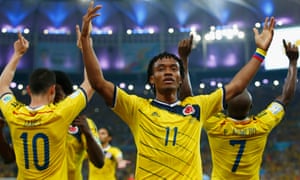This article is part of the Guardian’s 2018 World Cup Experts’ Network, a cooperation between some of the best media organisations from the 32 countries who have qualified for Russia. theguardian.com is running previews from two countries each day in the run-up to the tournament kicking off on 14 June.
Juan Cuadrado has two motivations to succeed in football. The first is the memory of his father, murdered when he was four years old, in Necoclí, the village where he was born on 26 May 1988. And the second, to protect, care for and treat his mother, Marcela, like a queen because she had to make so many sacrifices so her son could remain involved in sport and escape the cycle of violence that marked his childhood.
Life was not easy in Necoclí – in the department of Antioquia whose capital is Medellín – as it was scarred by the armed conflict that Colombia has suffered for more than 60 years. From a young age, Cuadrado had learnt from his parents: if he heard a shot, he had to run out and get under the bed. And it was on one of those occasions when he realised, after hearing Marcela cry, that his father Guillermo, a delivery truck driver, had been killed. There are very few memories the Juventus player still has of his father, but he takes care, every time he scores, to honour his memory, raising his arms to the skies.
The death of Guillermo made the rest of the Cuadrado family take a different direction, with Marcela guiding it. While Cuadrado was in the care of his uncles in Necoclí, his mother worked from Monday to Friday in Apartadó in the banana plantations, washing and packing them for export. She would take him to school and he would sleep in the classroom. But he was not happy. He called his grandmother to explain why. “My mum doesn’t love me,” he claimed. “She won’t let me play football.” Even though he then spent time with his grandmother, Marcela Guerrero, she too was frustrated. “I sent him to school but he used to come home filthy having spent the day playing football,” she said. “I punished and hit him because of the mess he was in.”
Cuadrado was already showing his ability at this young age. He always ran around, kicking what there was – rocks, balls – and his mother realised where his future could lie. So she enrolled him in a football school, first in Necoclí and then in Apartadó. The only condition was that if he wanted to play he could not stop studying. However his career could have ended before it had really begun. He was a very active child and one day, playing on a road, he snapped his achilles. Marcela punished him: she took away his football boots for a month.
Yet his talent became ever more obvious, to the point that his fame began to spread. He was spotted by Deportivo Cali, taken there by someone who was key in his early career, Nelson Gallego. “Juan lived with me for several years and I taught him how to be independent, how to manage these things, how to cook, study, everything like that,” he says.
He was only 12 when he went to Cali. If he used to see his mother every eight days, now things got much harder. In the end, he did not last long there, rejected because of his height: at that time he was only 4ft 4in (now he is 5ft 8). Shorty was his nickname. Other clubs, among them River Plate, were interested and then turned him down for the same reason before Medellín approached him and the manager, Gallego Santiago Escobar – brother of Andrés, murdered after the 1994 World Cup – liked what he saw of the small kid in the youth team. “He didn’t talk a lot but on the pitch he took his chance,” Escobar says. “I knew that with his talent he could end up playing for any team in the world.”

He played his first professional matches as a wing-back but sometimes Medellín played him up front before his talent caught the eye of Udinese, who signed him in 2009. The first thing he did was tell his mother to leave with him, that she had done enough for him and he did not want her to work anymore. He was going to take care of her. And since then, wherever he plays, she goes too: Udine, Lecce, Florence, London and now Turin.
He first played for the national team in September 2010, under Hernán Dario Gómez, starting and scoring against Venezuela. But it was José Pékerman who gave him a proper chance, deploying him behind Juan Camilo Zúñiga as a wide midfielder but then using him further forward. These days he is a fixture for Colombia. And whenever he can, he raises his arms to the sky and remembers his father, who takes care of him from heaven, and his mother, who is always with him in body and soul.
By José Orlando Ascencio writes for El Tiempo.
Follow him on Twitter here.